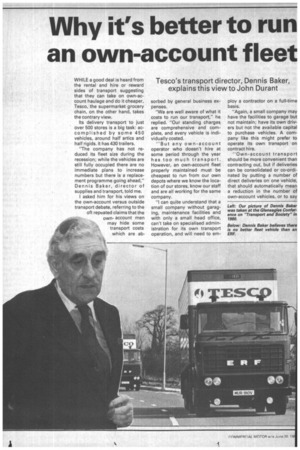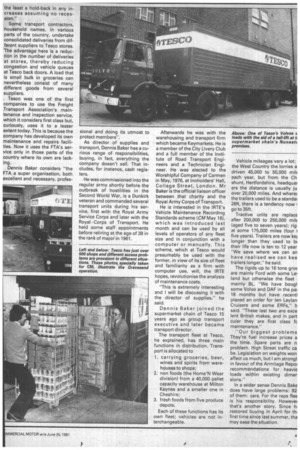Why it's better to run an own-account fleet
Page 42

Page 43

If you've noticed an error in this article please click here to report it so we can fix it.
WHILE a good deal is heard from the rental and hire or reward sides of transport suggesting that they can take on own-account haulage and do it cheaper, Tesco, the supermarket grocery chain, on the other hand, takes the contrary view.
Its delivery transport to just over 500 stores is a big task: acco mplished by some 450 vehicles, around half artics and half rigids. It has 430 trailers.
"The company has not red.uced its fleet size during the recession; while the vehicles are still fully occupied there are no immediate plans to increase numbers but there is a replacement programme going ahead," Dennis Baker, director of supplies and transport, told me.
asked him for his views on the own-account versus outside transport debate, referring to the oft repeated claims that the ownaccount men may hide some transport costs
which are ab
sorbed by general business expenses.
"We are well aware of what it costs to run our transport," he replied. "Our standing charges are comprehensive and complete, and every vehicle is individually costed.
"But any own-account operator who doesn't hire at some period through the year has too much transport. However, an own-account fleet properly maintained must be cheapest to run from our own depots where we know the location of our stores, know our staff and are all working for the same company.
"I can quite understand that a small company without garaging, maintenance facilities and with only a small head office, can't take on specialised administration for its own transport operation, and will need to em
ploy a contractor on a full-time basis.
"Again, a small company may have the facilities to garage but not maintain; have its own drivers but not the available capital to purchase vehicles. A company like this might prefer to operate its own transport on contract hire.
"Own-account transport should be more convenient than contracting out, but if deliveries can be consolidated or co-ordinated by putting a number of direct deliveries on one vehicle, that should automatically mean a reduction in the number of own-account vehicles, or to say the least a hold-back in any increases assuming no recession."
Some transport contractors, household names, in various parts of the country, undertake consolidated deliveries from different suppliers•to Tesco stores. The advantage here is a reduction in the number of deliveries at stores, thereby reducing congestion and vehicle queues at Tesco back doors. A load that is small bulk in groceries can nevertheless consist of many different goods from several suppliers.
Tesco was one of the first companies to use the Freight Transport Association's maintenance and inspection service, which it considers first class but, curiously, uses it to a lesser extent today. This is because the company has developed its own maintenance and repairs facilities. Now it uses the ETA's service only in those parts of the country where its own are lacking.
Dennis Baker considers "the FTA a super organisation, both excellent and necessary, profes sional and doing its utmost to protect members".
As director of supplies and transport, Dennis Baker has a curious range of responsibilities, buying, in fact, everything the company doesn't sell. That includes, for instance, cash registers.
He was commissioned into the regular army shortly before the outbreak of hostilities in the Second World War, is a Dunkirk veteran and commanded several transport units during his service, first with the Royal Army Service Corps and later with the Royal Corps of Transport. He held some staff appointments before retiring at the age of 39 in the rank of major in 1961. Afterwards he was with the warehousing and transport firm which became Keymarkets. He is a member of the City Livery Club and a full member of the Institute of Road Transport Engineers and a Technician Engineer. He was elected to the Worshipful Company of Carmen in May, 1976, at Innholders' Hall, College Street, London. Mr Baker is the official liaison officer between that charity and the Royal Army Corps of Transport.
He is interested in the IRTE's Vehicle Maintenance Recording Standards scheme (CM May 16), which was introduced last month and can be used by all levels of operators of any fleet size and in conjunction with a computer or manualty. This scheme, which at Tesco would presumably be used with the former, in view of its size of fleet and familiarity as a firm with computer use, will, the IRTE hopes, revolutionise the analysis of maintenance costs.
"This is extremely interesting and I will be discussing it with the director of supplies," he said.
Dennis Baker joined the supermarket chain of Tesco 15 years ago as group transport executive and later became transport director.
The transport fleet at Tesco, he explained, has three main functions in distribution. Transport is allocated to 1. carrying groceries, beer, wines and spirits from warehouses to shops; 2. non foods (the Home'N Wear division) from a 40,000 pallet capacity warehouse at Milton Keynes and a smaller one in Cheshire; 3. fresh foods from five produce depots.
Each of these functions has its own fleet; vehicles are not interchangeable. Vehicle mileages vary a lot; the West Country the lorries a driven 45,000 to 50,000 mil; each year, but from the Ch shunt, Hertfordshire, headquar ers the distance is usually ju over 20,000 miles. And where the trailers used to be a standar 26ft, there is a tendency now 1 go to 35ft.
Tractive units are replac€ after 200,000 to 250,000 mile (aged five to seven years); rig, at some 175,000 miles (four 1 five years). Trailers are now kej longer than they used to b; their life now is ten to 12 year "We save where we can an have realised we can kee trailers longer," he said.
The rigids up to 16 tons groE are mainly Ford with some Le land but otherwise the fleet mainly BL. "We have bougl some Volvo and DAF in the par 18 months but have recentl placed an order for ten Leylan Cruisers and some ERFs," h said. "These last two are exce lent British makes, and in part cular they are first class ft maintenance."
"Our biggest problems They're fuel increase prices a the time. Spare parts are n problem. High Street traffic ca be. Legislation on weights won affect us much, but I am strongl in favour of the Armitage Repo; recommendations for heavie loads within existing dimer sions."
In a wider sense Dennis Bake does have large problems: 92 of them: cars. For the reps flee is his responsibility. However that's another story. Since hi restored buying in April for thi first time since last summer, tha may ease the situation.








































































































